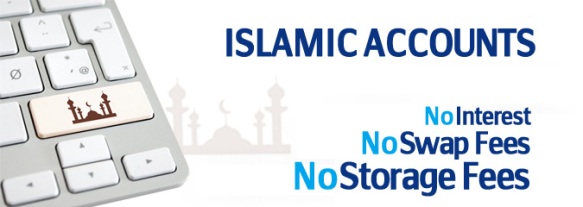There are many Forex brokers that offer today the option to open an Islamic account. To understand how these accounts work, you first need to understand the principles of Sharia (Islamic Law) and how it is applied in a compatible way to banking and finance. Sharia laws do not allow the acceptance of interest for monetary loans (known as riba or usury) if the payments are fixed or floating.
In 2009, there were more than 400 banks and 300 investment funds worldwide that were compliant with Islamic principles. As of 2014, Sharia-compliant financial institutions accounted for approximately 1% of the world’s total assets, totaling about $2 trillion in funds. Not all Muslims follow the laws of Sharia. According to the well-known accounting firm Ernst & Young, Islamic banking represents only a fraction of Muslims’ banking assets, but has been growing at an annual rate of 17,6% between 2009 and 2013, faster than bank assets as a whole and is expected to grow by an average of 19.7% per year until 2018.
Unlike conventional banking, Islam prohibits simply lending money with interest, so specific Islamic rules have been established in transactions to prevent this from happening. The fundamental principle of Islamic banking is based on risk-sharing, which is a component of the risk transfer view in conventional banking. Islamic banking employs concepts such as custody, profit sharing, cost pluses, and leasing.
The Islamic Accounts
Under normal commercial conditions, commodity and foreign exchange transactions are executed on the spot market throughout the day. At 17:00 New York time, all open positions will be renewed within the next 24 hours, and interest generated daily will be added to the company’s accounts every day. The broker can then pay the interest or collect the customer’s account to cover what is considered rollover fees. For traders holding overnight positions, rollovers can have a significant impact on the profitability of an account.
In an Islamic narrative, the concepts are different. This is because there should be no interest (Riba) for the entire duration of the Islamic account contract, any open transaction which at the end of the trading day automatically passes through the rollover poses a problem for those who follow Islamic Law because such transactions are considered usury. Therefore, conventional rollovers are simply not allowed.

Over the years, Islamic rules have been slightly adjusted to allow Muslims to participate in currency markets, without violating Sharia law. Most brokers now offer No-Swap accounts that can be used under certain conditions in order to allow traders, either trade as much as their money allows or take a loan from the broker on the condition that the institution does not receive any interest on the loan. In most cases, no commission or interest is charged on contracts that last more than 24 hours, and zero interest on the rollover is a constant.
The question of whether Forex trading is permissible under Islamic law is a difficult question to answer conclusively. Although the Islamic authorities certainly agree that Forex trading under certain conditions is halal (i.e., permissible under Islamic law), there is some controversy as to exactly what conditions. Let us examine the topics one by one after knowing the saying on this subject by the prophet Mohammed (peace be upon him):
“Silver for silver, gold for gold, barley for barley, wheat for wheat, dates for dates, salt for salt, as for equals, equals for, hand to hand. If guys are different then sell whatever you want, as long as it’s hand-to-hand.”
So, is there halal currency trading? Is it halal forex or haram?
Forex Trading – Halal or Haram Fatwa
Of course, as we have already mentioned, usury is completely prohibited in Islam and is broadly defined. This implies that any type of agreement or contract involving an element of interest (riba) is not permissible under Islamic law. For some time, retail Forex brokers reflected the market policy of charging or paying the trader the interest differential between the two participants of any currency pair whose transaction remained open overnight. Finally, almost all Forex brokers responded to market forces (and the demands of Islamic traders) by becoming “Islamic Forex brokers” and offering “Islamic Forex accounts” that operate without standard interest payments. You could ask how they did it and maintained the profitability of their trades.
This was achieved through increased commissions on spot forex trades, and this practice has become the hallmark of almost all Islamic Forex brokers. Possibly, this in itself is just a component of camouflaged interest, and if you take this view, it makes trading Forex problematic under Islamic law. This interesting problem also discourages any possibility of trading with Forex, as on all occasions there is an element of interest involved in these transactions. However, the “regular” forex trading offered by Forex brokers, without payments or one-day interest charges, could remove the hurdle of riba.

What Islam Says About Online Forex Trading
After having reduced the problem to one of spot trading Forex and assuming that there is no element of interest is considered to be involved, we move on to the next issue. It seems to be permissible only “as long as the exchange is hand-to-hand”. So very clearly, the prophet Mohammed (peace be upon him) took into account the exchanges of different kinds of goods to be made between two parties, recognizing that this was a natural and fair aspect of trading.
The question here is what is considered “hand-to-hand”. In the old days, of course, there were no computers or phones, so the look of making a face-to-face (or hand-to-hand) deal was not a big question. In fact, it could be said to be natural and well accepted for an agreement made between two different parties. In current times, it can be argued that as far as Forex trading is concerned, the agreement is made between a Forex broker and a trader, so it would be qualified under the definition of two different parties, which would be admissible under Islamic law.
A widely recognized stipulation is that the actual exchange must take place during the same “session” in which the contract is made, that is, the transactions must be concluded more or less immediately. We seem to be on solid ground here, as when a trade is done with a Forex broker, which takes effect immediately. Curiously, this might suggest that all non-market trades (i.e., stop or limit orders) are haram!
This is where we come up with the biggest hurdle in trying to answer the question “Is Forex halal or haram?” In general, Forex traders do not expect to take real delivery of the currency they are “buying”, and never actually the currency itself they are “selling. They’re simply speculating that one’s value will go up and another’s value will go down.

Is such speculation permissible under Islamic law? This is a question that is not easy to answer and may be one that must be discussed with its own religious leader rather than being decided based on an Internet article. However, we have researched the topic thoroughly and will outline some points of thought below.
We can begin by saying that Islam recognizes that almost all adults focus their efforts to improve their financial investments and that life involves a great element of uncertainty. In life, we face many choices, the outcome of which is not clear, and we strive to use intelligence and the ability to choose the available option that will produce the higher result. However, we must continue to say that gambling is strictly prohibited by Islamic law, even as a form of recreation or entertainment when it is done with small funds that the player can be said to be able to afford to lose.
By measuring these two competing components, it can be concluded that it is the system of speculation that makes the difference. One author has thoroughly examined the topic and has categorically stated that speculation based on fundamental analysis is accepted, but the technical analysis is not permissible; and there is interesting reasoning: Placing operations based on technical analysis essentially amounts to betting on the bets of others and Relying on the behavior of the crowd to influence their speculation is steeped in the essence of the game, which is prohibited by Islamic law.
However, this argument can certainly be criticised as spurious in relation to market realities. To take an example, it is a speculator who has the belief that the US dollar will rise against its euros because of the economic fundamentals required to simply trade immediately, and forbidden to take any action for time trading entry to a psychologically opportune time?
Once you have done your research carefully, you can decide whether the Islamic forex accounts are right for you. A stronger argument might be that a Muslim has no business speculating on foreign exchange markets unless he or she has a firm foundation to anticipate success. This clearly means that trades must involve either some component of technical or fundamental analysis in which the trader really has a strong reason to believe.
An example could be, following trends that have an academically established track record as a cost-effective method of trading in financial liquidity Markets and trading these trends using Islamic brokers FX.
A trader can argue that a strong technical trend is easier to understand – and also likely to have an underlying reason (though invisible) behind it – a classic fundamental economic outlook that could be discussed by professional economists.
Creating a Muslim Forex Account
There is virtually no doubt that Forex trading is permissible in Islam, as long as there is no element of interest, it is done hand in hand (although this phrase can be translated in many ways), and that the exchanger has a valid reason to anticipate a probable profit based on an analysis that is not based on the psychology of the game. On a solid basis, Islamic Forex brokers can be hired for trading, which should at least possibly eliminate all riba challenges. As we have already analyzed, there are certainly gray areas within this rating that must be thoroughly investigated in good faith and conscience by anyone who wishes to start halal Forex trading with a Muslim Forex account.

Revenue from the Spread
So how does a broker win on Islamic accounts? Broker income comes strictly from spreads, which is the difference between Ask and Bid prices in a currency pair. Many brokers that offer No-Swaps accounts increase the spreads on these accounts or request an additional commission or charge so, at the end of the day, it is like paying interest earned in night positions, but very often at a higher pace.
Other brokers offer the Islamic account without commission or additional charge and maintain the same spread as in swap accounts. There are also brokers who usually offer additional benefits for Hibah-shaped No-Swap accounts. Hibah is donations or gifts given voluntarily; for this reason, the broker does allow its Muslim customers to donate a part of their profits to charity.
Conclusion
It should be emphasized that, although we have investigated the subject of Islamic trading and its validity within Islamic law in length, we are in no way trying to provide religious guidance to you, the readers of this article, or their acquaintances. As evidenced by the research presented here, there are certainly many people who believe that, under the right circumstances, Islamic currency trading is allowed. But, there may be some who are not comfortable using these solutions, and this is a completely valid approach as well.
If you are excited to further investigate this issue or consider how each Forex broker implements their Muslim Forex system, our recommendation is to evaluate the leading Islamic Forex brokers and talk to their commercial partners if you have any questions, questions, or concerns about how their practices relate to Islamic law. A solid and respectable Forex broker must have concrete and accurate answers and will make you feel comfortable, not uncomfortable.
With the expansion of the Muslim community into business, Forex brokers are doing their best to accommodate Islamic accounts. Not all brokers have gotten on the cart for the moment, but if they want to stay competitive they will have to add this feature to their offers.

